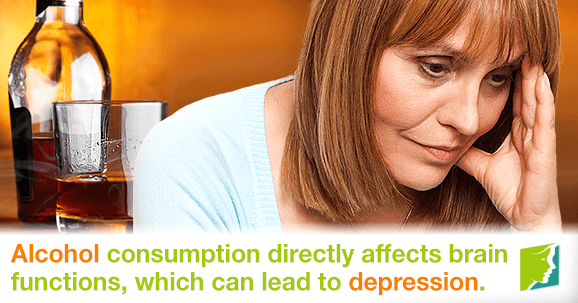It is no secret that there is a link between alcohol and depression. The reasons people drink alcohol vary - it can be taken as part of a ritual, to increase social confidence, and can even work as a natural sedative. Read on to learn more about alcohol and depression and the link between them.
Alcohol
Alcohol is a drug created from the fermentation of yeast into ethanol, the active ingredient in alcoholic beverages. It is a widely-used recreational drug that is the result of yeast breaking down glucose into ethanol, a process known as fermentation. Drinking small amounts is generally harmless, but regularly consuming large quantities can take its toll on the body, sometimes resulting in alcohol poisoning and liver disease.
Alcohol works by slowing down the central nervous system and inhibiting brain functions. It is these mechanisms that give alcohol its “depressant” status, and the reason that they are so closely linked. Some of the possible effects of alcohol consumption are the slowing of reflexes, impeded judgment, and lack of balance and coordination. If a woman stays within the limit of 14 units a week, alcohol will not normally cause long-term problems, but regularly exceeding this limit can lead to various negative effects, especially on the liver.
Depression
Depressed feelings are a normal reaction to stressful events, such as a loved one passing away. However, when these feelings last for two straight weeks or more and impede daily functioning, the person is said to be suffering from clinical depression, a condition which can negatively affect all aspects of life. The lifetime risk of an individual developing depression is about 17%.
Symptoms are numerous, and include fatigue, feelings of worthlessness, and concentration problems. The causes of depression are normally a complex interplay of genetic, hormonal, and lifestyle factors. Some of the common causes of the illness are chronic stress, isolation, and too much alcohol. Alcohol and depression often go hand-in-hand, as misuse can also be a symptom as well as a cause, and can often arise from a person trying to deal with depressed feelings, and this ultimately worsens them.
The Link
Alcohol is a depressant, so there is naturally a link to depression and low mood. The drug slows the central nervous system and inhibits brain functions. The link between both is that alcohol consumption directly affects brain functions, which can lead to depression; on the other hand, the short-term mood-elevating effects of the drug can lead to sufferers of depression becoming dependent.
The main cause of depression seems to be hormonal fluctuations and genetics. This means that in the long term, depression can arise. However, the link between alcohol and depression is not just about the length of time - it is also about amount. Therefore, some argue that depression is not caused by alcohol, but rather, having depression means a person is more likely to drink excessive amounts.
The link is strong and hard to ignore. It is not enough for an individual to simply cut back on alcohol, but they also need to implement other healthy lifestyle choices. If you are concerned about depression, alcohol consumption, or both, it is important to talk to a doctor, who will be able to provide appropriate treatment and support.
Sources
- Alcohol and You. (n.d.). How is alcohol made? Retrieved October 24, 2014, from http://www.alcoholandyou.org.uk/facts/howisitmade.html
- Almeida, O.P. et al. (2014). The triangular association of ADH1B genetic polymorphism, alcohol consumption and the risk of depression in older men. Molecular Psychiatry, 19, 995-1000. doi:10.1038/mp.2013.117
- Anxiety and Depression Association of America. (2014). Depression. Retrieved October 24, 2014, from http://www.adaa.org/understanding-anxiety/depression
- Anxiety and Depression Association of America. (2014). Symptoms. Retrieved October 24, 2014, from http://www.adaa.org/understanding-anxiety/depression/symptoms
- Drinkwise Australia. (2014). What are you really drinking? Retrieved October 24, 2014, from http://www.drinkwise.org.au/you-alcohol/alcohol-facts/what-is-alcohol/
- National Health Service UK. (2013). Alcohol misuse. Retrieved October 24, 2014, from http://www.nhs.uk/conditions/Alcohol-misuse/Pages/Introduction.aspx
- National Health Service UK. (2014). Clinical depression - Causes. Retrieved October 24, 2014, from http://www.nhs.uk/Conditions/Depression/Pages/Causes.aspx
- National Institute on Alcohol Abuse and Alcoholism. (2002). Alcoholism and Psychiatric Disorders. Retrieved October 24, 2014, from http://pubs.niaaa.nih.gov/publications/arh26-2/90-98.htm
- Royal College of Psychiatrists. (2014). Alcohol and Depression. Retrieved October 24, 2014, from http://www.rcpsych.ac.uk/healthadvice/problemsdisorders/alcoholdepression.aspx



